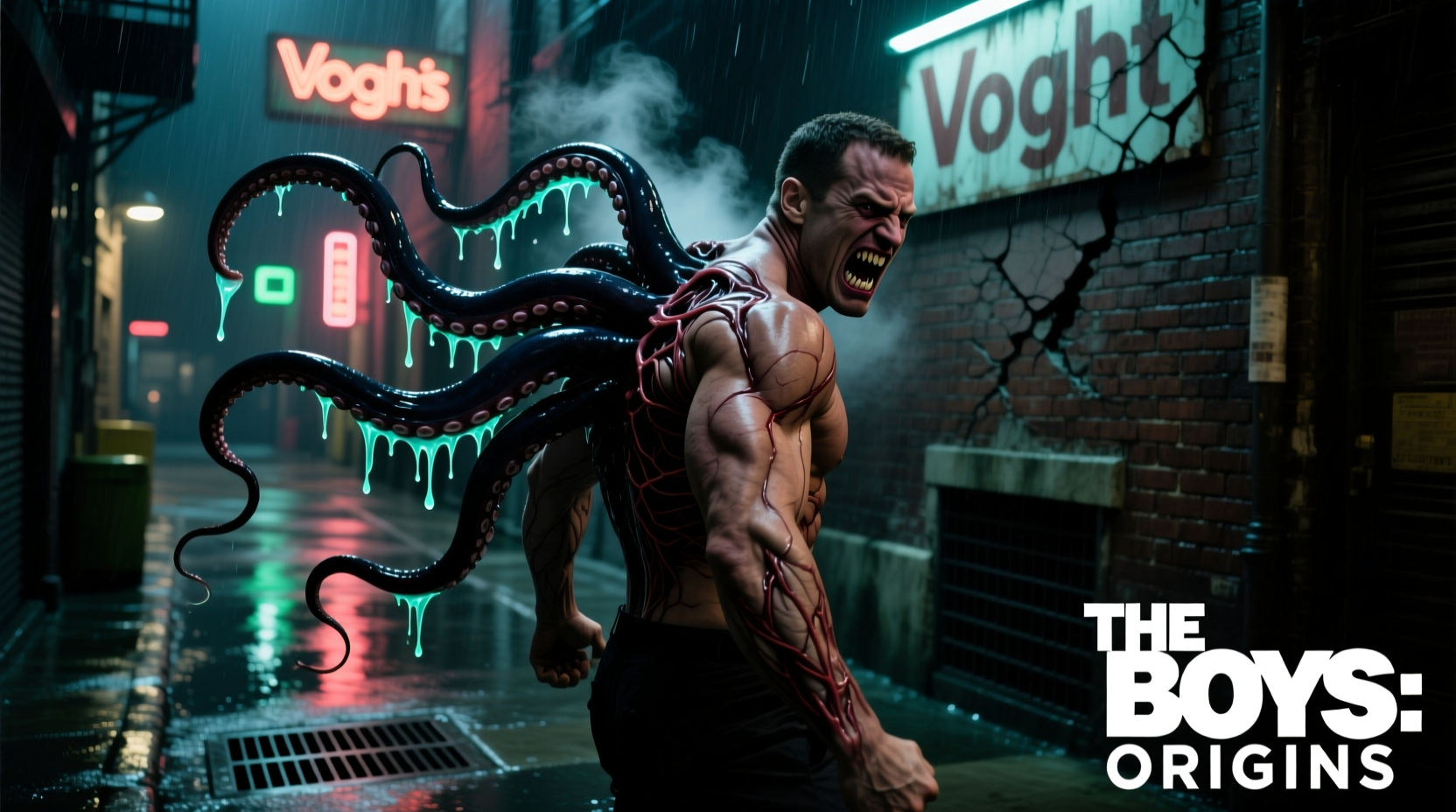In the explosive third season of Amazon’s *The Boys*, fans were stunned when Billy Butcher—long known as a ruthless, unpowered vigilante—suddenly began manifesting grotesque, writhing black tentacles from his arms. This dramatic shift wasn’t just a visual spectacle; it signaled a profound turning point in Butcher’s character arc and the show’s overarching narrative about power, corruption, and sacrifice. Unlike other superheroes who gain abilities through controlled doses of Compound V, Butcher’s transformation is rooted in desperation, deception, and a Faustian bargain with Vought’s most dangerous science.
This article breaks down the full story behind Butcher’s tentacle powers: how he got them, what they mean biologically and symbolically, and how this development alters his role in the fight against supes.
The Origin: Temp-V and Its Consequences

Butcher’s tentacles are not a natural mutation or a side effect of standard Compound V. Instead, they stem from an experimental, unstable variant known as Temp-V. Developed by Vought International as a short-term performance enhancer for supe soldiers, Temp-V grants superhuman strength, speed, and durability—but only temporarily. More critically, it comes with devastating long-term consequences.
Butcher learns of Temp-V during Season 3 while hunting Soldier Boy, Vought’s original superhero. Desperate to match the raw power of supes like Homelander and Stormfront, Butcher seeks out Dr. Greg Mallory (son of the original Seven leader), who reluctantly provides him with a vial of the drug. The catch? Temp-V is designed to degrade the user’s body over time. Prolonged use leads to irreversible cellular breakdown, neurological damage, and eventually death.
Biological Transformation: How Tentacles Form
The black, vein-like tentacles erupting from Butcher’s skin are a visible manifestation of Temp-V’s destabilizing effect on his biology. Unlike refined Compound V, which integrates cleanly into DNA, Temp-V forces rapid, chaotic cell replication. This causes hyper-mutation in muscle and connective tissues, resulting in external growths that resemble organic weapons.
These tentacles are not merely cosmetic—they are functional. Butcher uses them to constrict enemies, break bones, and deliver crushing blows. In combat, they act as extensions of his will, responding instinctively to threats. However, each use accelerates his physical deterioration. By the end of Season 3, Butcher exhibits signs of internal bleeding, memory loss, and organ failure—hallmarks of Temp-V poisoning.
According to showrunner Eric Kripke in an interview with *Entertainment Weekly*:
“The tentacles represent Butcher becoming the very thing he hates. He’s turning into a monster—not because he wants to, but because the system leaves him no choice.” — Eric Kripke, Creator of *The Boys*
Symbolism and Character Arc
Butcher’s transformation is more than a sci-fi twist—it’s a narrative device that underscores the show’s central theme: power corrupts, and vengeance consumes. For seasons, Butcher has positioned himself as the anti-hero fighting against corrupted supes. Yet, by injecting Temp-V, he crosses a moral line. He willingly embraces mutation, knowing it will destroy him, all to gain enough strength to kill Homelander.
The tentacles serve as a physical metaphor for this inner decay. They are dark, invasive, and uncontrollable—just like Butcher’s obsession with revenge. As his body changes, so does his psyche. He becomes colder, more calculating, willing to manipulate even his closest allies, including Hughie and Becca’s son, Ryan.
In one pivotal scene, Butcher stares at his reflection as tentacles writhe under his skin. There’s no triumph—only grim acceptance. He sees himself not as a hero, but as a weapon forged in hatred.
Comparison: Compound V vs. Temp-V
| Feature | Compound V (Standard) | Temp-V (Experimental) |
|---|---|---|
| Source | Vought labs, regulated distribution | Black-market, military-grade prototype |
| Effect Duration | Lifelong (if administered early) | Hours to days per dose |
| Side Effects | Mild (e.g., acne, aggression) | Severe (organ failure, mutation) |
| Physical Changes | None beyond enhanced physique | Tentacles, discoloration, scarring |
| Longevity Risk | Low to moderate | Fatal within weeks of repeated use |
Real-World Parallels: Performance Enhancers and Addiction
Butcher’s reliance on Temp-V mirrors real-world struggles with performance-enhancing drugs—particularly in high-stakes environments like elite sports or military operations. Like athletes who risk long-term health for short-term dominance, Butcher prioritizes immediate results over survival.
A mini case study illustrates this:
What Happens Next? Future Implications
As of Season 3, Butcher is alive but dying. His final confrontation with Homelander looms, and it’s unclear whether he’ll survive—or if he even wants to. The tentacles suggest a trajectory toward full metamorphosis, possibly ending in self-destruction or containment.
Rumors suggest Season 4 may explore a cure or suppression method, potentially involving genetic research from Liberty or underground scientists. However, removing the Temp-V could strip Butcher of his only advantage against Homelander, forcing a different kind of showdown—one based on strategy rather than brute force.
FAQ
Can Butcher control his tentacles?
Yes, but only partially. The tentacles respond to adrenaline and threat detection, making them unpredictable in high-stress situations. With focus, Butcher can direct them, but prolonged use increases pain and fatigue.
Is Temp-V permanent?
No, but its effects are cumulative and irreversible. Even if Butcher stops using it, the mutations and internal damage remain. There is currently no known antidote in the show’s universe.
Will Butcher become a full supe?
Unlikely. Temp-V doesn’t grant stable superpowers like flight or laser vision. It enhances physical traits temporarily while causing fatal degradation. Butcher is evolving into something monstrous, not heroic.
Actionable Checklist: Understanding Butcher’s Power Journey
- Recognize that Butcher’s powers come from Temp-V, not natural ability.
- Understand that each use accelerates his physical decline.
- Analyze how the tentacles symbolize moral and physical corruption.
- Compare Butcher’s arc to other characters who gained power at great cost (e.g., A-Train, Stormfront).
- Consider the ethical dilemma: Is destroying Homelander worth Butcher becoming a monster?
Conclusion: The Cost of Vengeance
Billy Butcher’s tentacle powers are not a gift—they are a curse born of rage, loss, and a broken system. They represent the ultimate irony: the man who dedicated his life to destroying supes must become one to succeed. His transformation challenges viewers to ask difficult questions about justice, sacrifice, and what we’re willing to become in the name of righteousness.
The Boys has always been a satire of power and propaganda. Butcher’s descent into mutation amplifies that message. He is no longer just a killer with a cause—he is a walking consequence of Vought’s unchecked experimentation and societal complicity.









 浙公网安备
33010002000092号
浙公网安备
33010002000092号 浙B2-20120091-4
浙B2-20120091-4
Comments
No comments yet. Why don't you start the discussion?